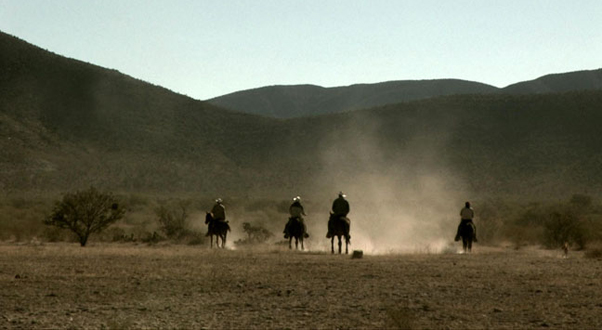 Back to selection
Back to selection
Five Questions with Drought Director Everardo González

In Everardo González’s Drought, the residents of a barely-there area in northern Mexico called Cuates de Australia (a strange names whose origins even they aren’t sure of) search for water and travel about during the annual drought. The toll it takes on the land, people, and animals is sometimes deadly. A sort of documentary answer to Spring, Summer, Fall, Winter…and Spring, the film won the nonfiction prize at this year’s L.A. Film Festival and will play at the IFC Center in New York and Laemmle’s NoHo 7 starting this Friday as part of DocuWeeks. Filmmaker spoke to González about the project’s origins, participants, and most unsettling moments. (Note: González responded in Spanish and the film’s publicist, Carlos A. Gutiérrez, translated.)

Filmmaker: What initially drew you to the project?
González: I always wanted to work closely with the muleteers. My father is a veterinarian, and my earliest memories have to do with cattle ranches, so this project was an opportunity to do so. The name of the ranch was a powerful magnet; a place called “Friends of Australia” in northeastern Mexico was motivation enough to travel there to see the place. That’s where I learned about the exoduses caused by the drought. The story seemed very cinematic and socially relevant.
Filmmaker: Throughout the film, I was trying to imagine how these people might have reacted when you first approached them. Were they surprised or even suspicious?
González: At first the people had divided opinions about my presence at the ranch. It’s a place where people know each other since childhood and have hardly met anyone else but their neighbors and relatives in all of their lives. Some of them opened their doors immediately to me, and some others looked at me with suspicion.
At the beginning it was all rumors: they said I was there to measure the land to buy it, that I was there in search of a wife, that I was going to take the kids away. The time I spent there became a very important factor. Over the span of three years the rumors became acceptance. I decided not to film those who disagreed and interestingly, after I screened the film to them, those who disagreed at first and were not included were now complaining about being left out of the film…it’s hard to please people.
Filmmaker: Certain moments in Drought — especially one involving an animal that I won’t go into details on — are haunting in a way that made me feel helpless just by watching them. Did you ever feel that way yourself?
González: The image of sacrifice was something that was spinning in my head during the months I was at the ranch; the idea that death is absolutely necessary for the reemergence of life was a concept that I wanted to tell throughout the film. The adaptation to the ranch also implies the adaptation to environment. Of course I felt helpless at times, but I also think I began to accept the nature of the cycles and the function of death in such a hostile environment like the desert.
Filmmaker: Something else that occurred to me was how utterly dependent these men and women are on the land, barren and unforgiving though it may be. It almost seems like, the harsher the environment is, the closer the connection between it and the people becomes.
González: The same thought was the one that accompanied me throughout the shooting of the film: people left but would always come back. Obviously the connection to the land is the engine that drives every day, the people of this desert recognize themselves in the landscape, they are the environment themselves, generous and beautiful but unforgiving and hostile as the spines of cacti and the coyotes.
Filmmaker: Though a change occurs, it’s hard to feel as though these people are better off in any significant way. At what point did you feel “done” in filming them—was there a certain event, or had enough time simply passed?
González: The birth of the child was the last thing we shot. That event was the thermometer that told us we were done.
Follow Michael on Twitter: @slowbeard
